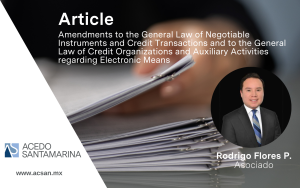
In this article we will discuss the concept of the state of interdiction to which persons with some type of physical, sensory, intellectual, emotional and/or mental disability may be subject, based on the provisions of the law as well as the perspective that the Supreme Court of Justice of the Nation has had in recent years regarding the constitutionality of such legal institution.
In terms of the provisions of section II of article 450 of the Civil Code for Mexico City, “have natural and legal incapacity: Those of legal age who due to reversible or irreversible illness, or who due to their particular state of disability, whether physical, sensory, intellectual, emotional, mental or several of them at the same time, cannot govern themselves, bind themselves or manifest their will, by themselves or by some means that can replace it”. The above implies a restriction to the exercise capacity of persons and has as one of its main consequences that a guardian is appointed to make the interdicted person’s decisions, a restriction that Article 23 of the Civil Code for Mexico City states does not mean that the dignity of the person subject to the state of interdiction is undermined.
However, Article 2 of the same civil legislation states that “No person, because of […] physical character, disability or state of health, may […] be restricted in the exercise of his rights, regardless of their nature”. In this sense, it is valid to consider that there is an evident contradiction in the aforementioned legal system by prohibiting, on the one hand, to limit the exercise of the rights of persons as a consequence of illness or any disability, and on the other hand, to impose restrictions to their capacity to exercise, such as the appointment of a guardian.
In 2011, the Supreme Court of Justice of the Nation resolved amparo en revisión number 159/2013, filed by an adult with an intellectual disability (Asperger’s syndrome), who was subjected to an interdiction trial and placed under the guardianship of his parents, a procedure of which he was never informed. In his appeal, the plaintiff essentially invoked the unconstitutionality of Articles 23 and 450 of the Civil Code for Mexico City, alleging that the state of interdiction limits his legal capacity in an unjustified manner. In ruling on the aforementioned appeal, the Supreme Court declared the constitutionality of such legal provisions, provided that they were interpreted in light of the social model of disability.
The sentence issued by our Highest Court may be contradictory to Article 12 of the Convention on the Rights of Persons with Disabilities, which establishes that: “Persons with disabilities have legal capacity on an equal basis with others […]”, a provision that at that time ceased to be observed by the Court, which since the constitutional reform on human rights in 2011, is obliged to carry out a conventionality control of the norms that are part of our legal system.
Eight years later, in March 2019, in ruling on amparo en revisión 1368/2015, the First Chamber of the Supreme Court of Justice declared the unconstitutionality of Articles 23 and 450, section II, of the Civil Code for Mexico City, considering that they are not in accordance with the Convention on the Rights of Persons with Disabilities or with Article 1 of the Constitution, noting that it is unconstitutional to deny and/or limit persons with disabilities with respect to their legal capacity, decision-making, exercise of autonomy of will and rights in general.
Interaction processes between people with disabilities and their environment, mainly in mobility, free communication and access to information.





